December 6th, 2025 by admin
QStudio 5.0 is now Open Source after 13 years of development!
QStudio remains a fast, modern SQL editor supporting over 30 databases including MySQL, PostgreSQL, DuckDB, QuestDB, and kdb+/q. Version 5.0 continues our focus on performance, analytics and extensibility now with an open community behind it.
🎉 QStudio Is Now Open Source
After 13 years of development, QStudio is now fully open source under a permissive license. Developers, data analysts and companies can now contribute features, inspect the code, and build extensions.
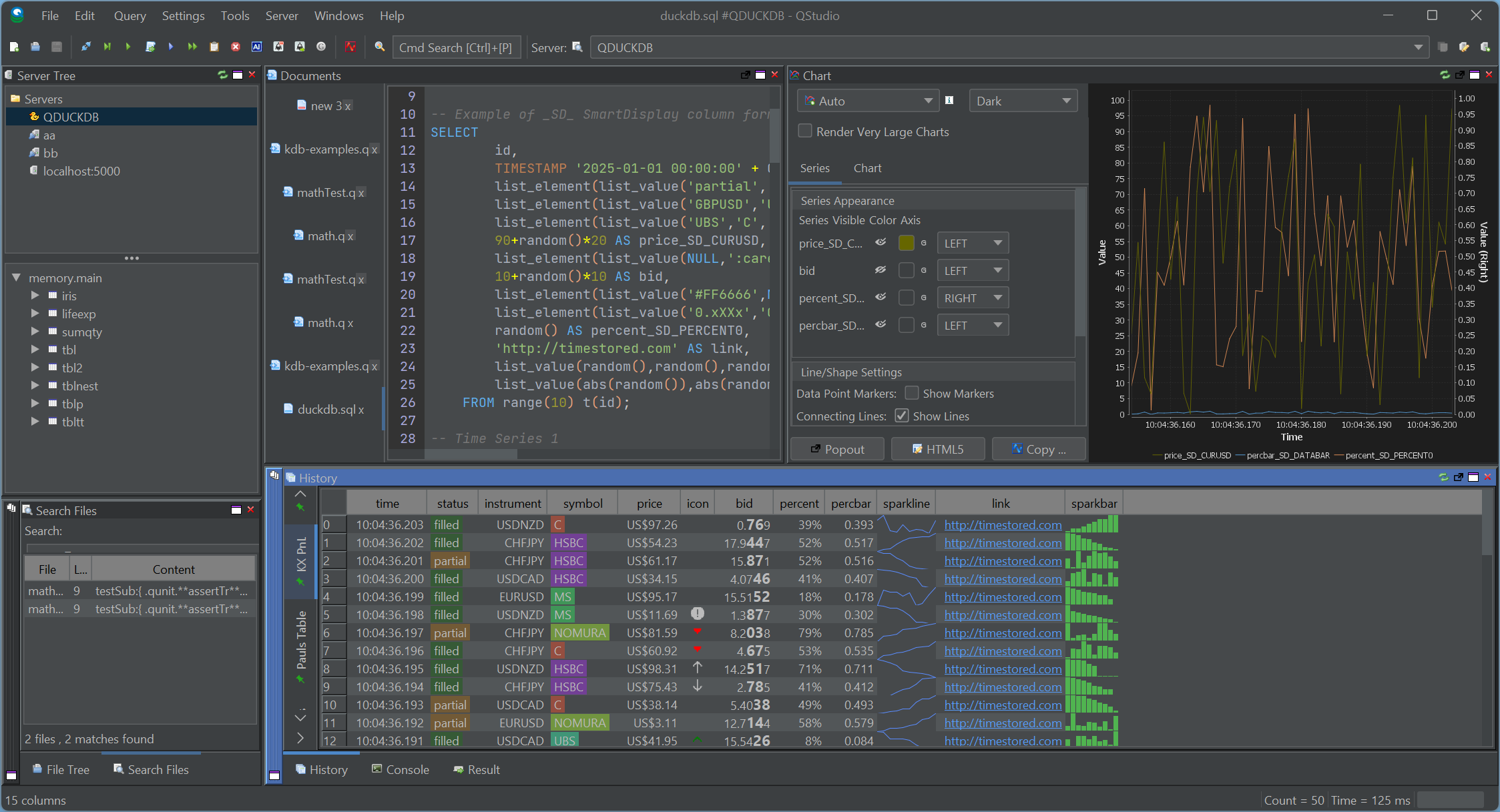
Open Source Without the Fine Print.
No enterprise edition. No restrictions. No locked features. QStudio is fully open for personal, professional, and commercial use.
New Features with 5.0
New Table Formatters, Better Visuals, Better Reporting
 SmartDisplay is QStudio’s column-based automatic formatting system. By adding simple _SD_* suffixes to column names, you can enable automatic number, percentage, and currency formatting,Sparklines, microcharts and much more. This mirrors the behaviour of the Pulse Web App, but implemented natively for QStudio’s result panel.
SmartDisplay is QStudio’s column-based automatic formatting system. By adding simple _SD_* suffixes to column names, you can enable automatic number, percentage, and currency formatting,Sparklines, microcharts and much more. This mirrors the behaviour of the Pulse Web App, but implemented natively for QStudio’s result panel.
Spark Lines + Micro Charts

Comprehensive Chart Configuration
Fine-tune axes, legends, palettes, gridlines and interactivity directly inside the chart builder.
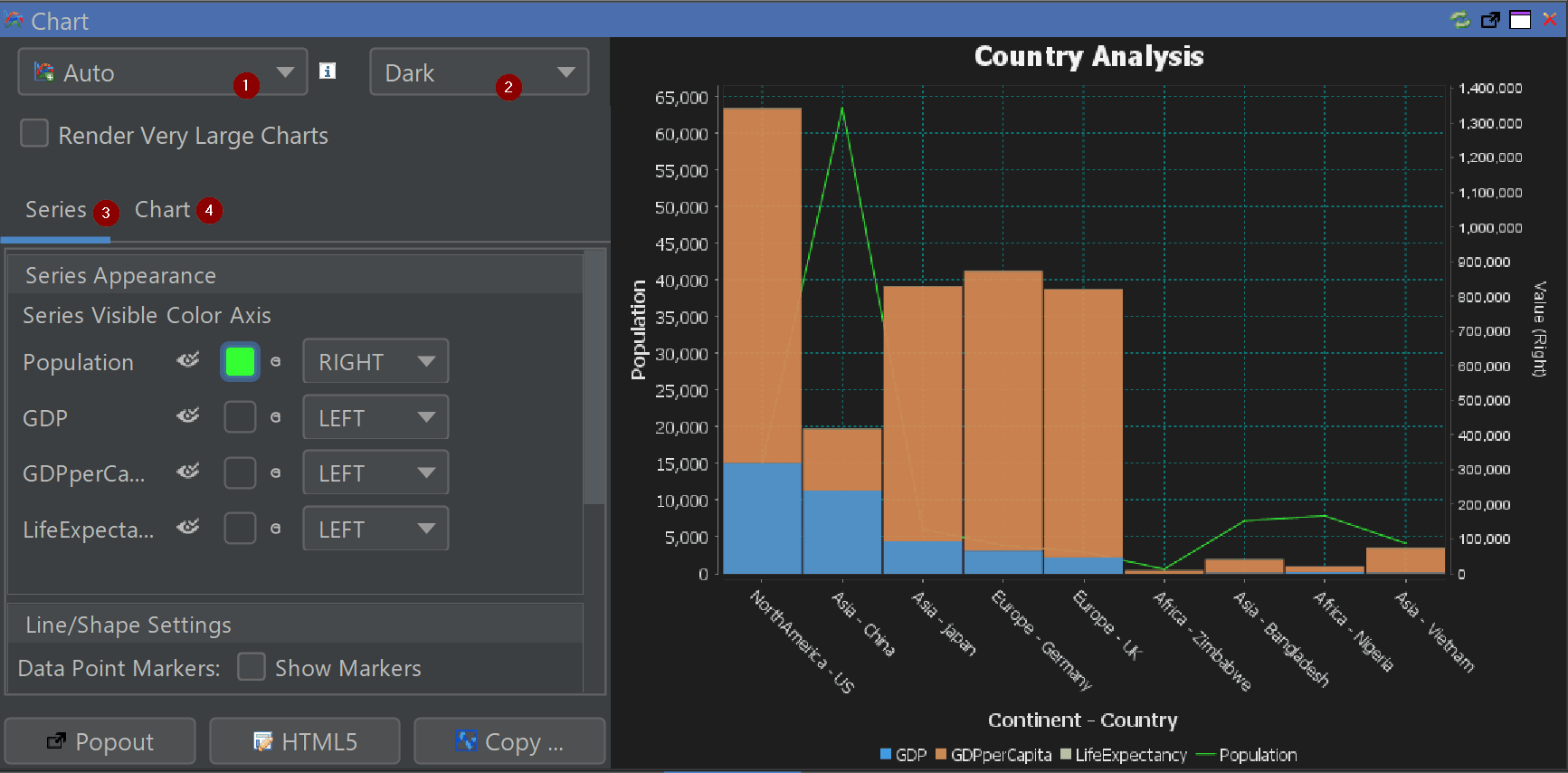
New Chart Themes
Excel, Tableau and PowerBI-inspired styles for faster insight and cleaner dashboards.

Other Major Additions
- Back / Forward Navigation — full browser-like movement between queries.
- Smart Display (SD) — auto-formats tables with min/max shading and type-aware formatting.
- Conditional Formatting — highlight rows or columns based on value rules.
- New Code Editor Themes — dark, light and popular IDE-style themes.
- Extended Syntax Highlighting — Python, Scala, XPath, Clojure, RFL, JFlex and more.
- Improved kdb+/q Support — nested / curried functions now visible and navigable.
- Search All Open Files (Ctrl+Shift+F)
- Navigation Tabs in Query History — with pinning.
- Improved Chinese Translation
- DuckDB Updated to latest engine.
- Hundreds of minor UI and performance improvements
- Legacy Java Removed — cleaner, modern codebase.
Code Editor Improvements
Better auto-complete, themes and tooling for large SQL files.
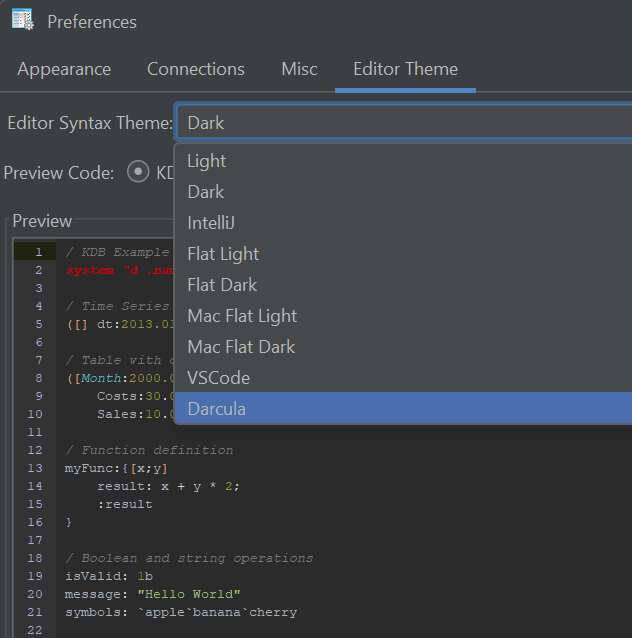
Pinned Results
Pin results within the history pane for later review or comparison.

Search Everywhere
Control+Shift+F to search all open files and your currently selected folder.
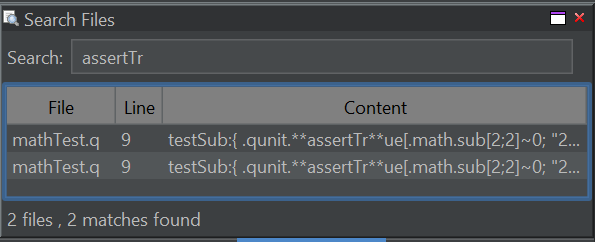
Our History
- 2013–2024: QStudio provided syntax highlighting, autocomplete, fast CSV/Excel export and cross-database querying.
- Version 2.0: QStudio expands support to 30+ Databases.
- Version 3.0: Introduced DuckDB integration, Pulse-Pivot, Improved export options.
- Version 4.0: Introduced SQL Notebooks and modern visuals.
- Version 5.0: Open Source + hundreds of improvements across charts, editing, navigation and data analysis.
We aim to create the best open SQL editor for analysts and engineers. If you spot a bug or want a feature added, please open an issue
November 27th, 2025 by admin
Pulse 3.28 is now released. (Release notes)
Table Footers
You can now add table footers that show aggregated views of the data including average, count and sum.
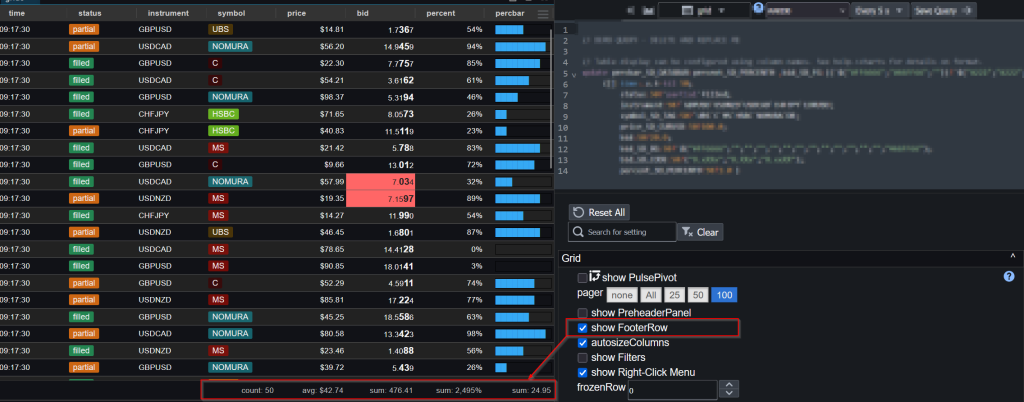
The aggregation function for a given column can be chosen within the column specific configuration:
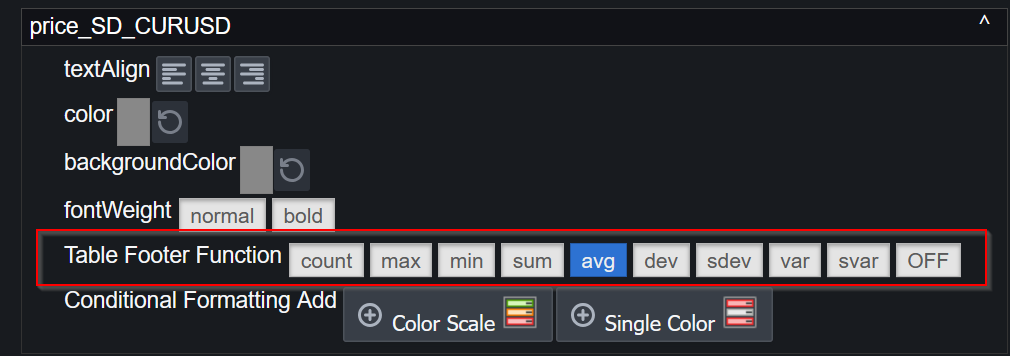
Column Statistics
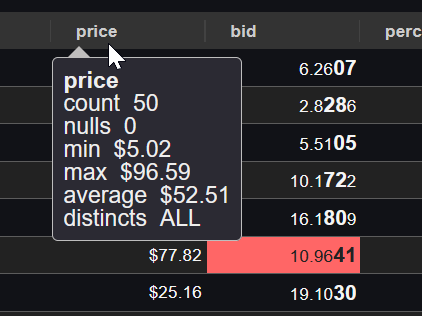
Allow users to get an overview of the data in one column. How many unique values does it contain, nulls, minimum, maximum etc.
Other additions include:
November 23rd, 2025 by admin
QStudio 4.15 Released today with new “Find All” – Press Control+Shift+F to activate.
Download Now.
Thanks to JPArmstrong for the idea.

Added highlighting support for python, closure, jflex, rfl, javascript, scala, xpath.
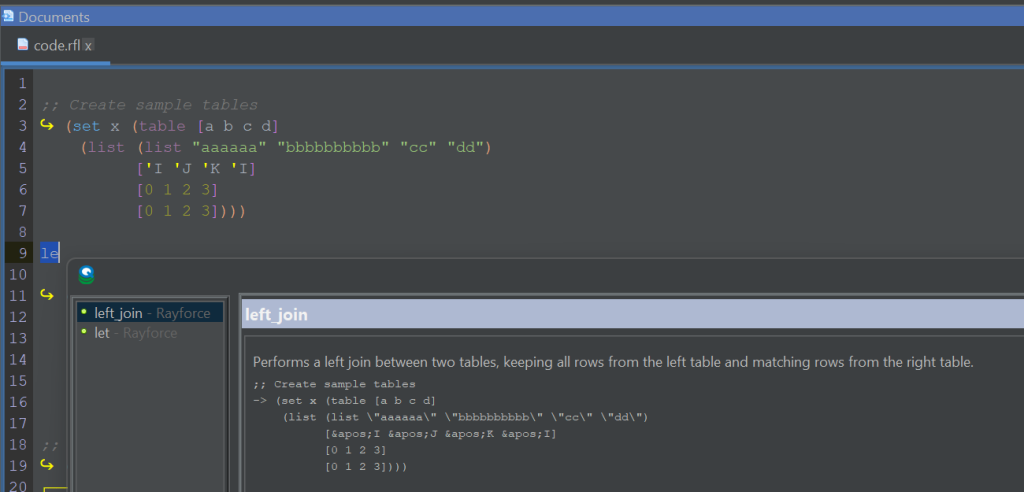
September 15th, 2025 by admin
Pulse 3.25 released with Conditional formatting, a new form creator and new date picker widgets:
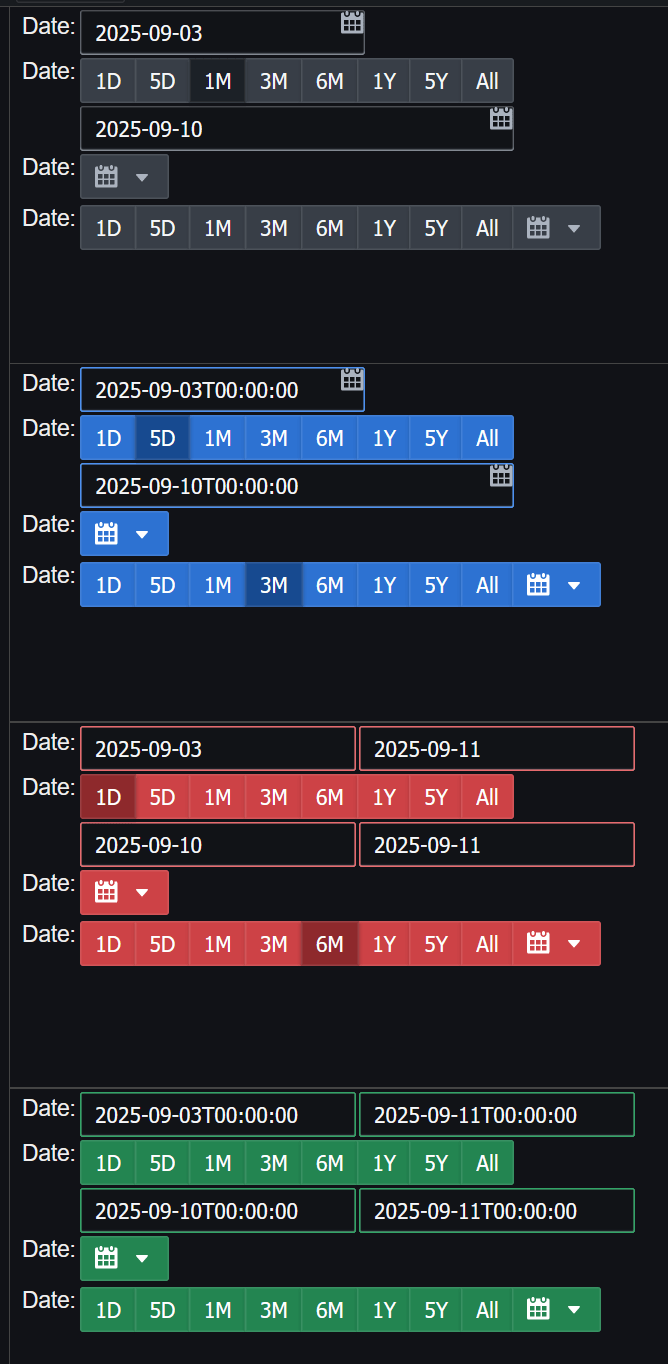
- 2025-09-13 – 3.25 – Enable User Customization.
- Add burger menu that allows end user chart and table customization (user Control option?).
- Add conditional formatting to right-click context menu.
- Tags support multiples.
- SQL Notebooks – Add copy to clipboard to code displays.
- Add Clickable SD_LINK columns in tables help.
- Connection Scalability – Improve JDBC connection pool settings for large 100+ user deploys.
- 2025-09-10 – 3.24 – Improvements to Forms
- Forms – Form editor now supports multi-column drag-and-drop.
- Add Icon support to buttons and text inputs.
- Select multi-dropdown supports select
__ALL__ for when there are lots of options.
- Add intent and size support to all controls.
- Checkbox and Radio support segmented style.
- Improved date pickers help.
- Change default to 30 min refresh.
- Add ability to delete variables in debug UI.
- bugfix: Select multi-dropdown no longer scrolls to top on selection.
- bugfix: Non-editors shown some editor controls when receiving URL.
- bugfix: SQL Notebooks – Fix show queries button.
September 4th, 2025 by admin
- We previously wrote an article on: Kdb+ Acquired by Private Equity
- In July KX was acquired by TA and went private.
- Today 2025-09-04 we are hearing that 100 plus staff may have been let go.What does this mean for KX next?
Update 2025-09-13 – Number being reported is closer to 200.
Update 2025-09-15 – KX and onemarketdata (onetick) have merged.
https://kx.com/news-room/kx-and-onetick-merge-to-unite-capital-markets-data-analytics-ai-and-surveillance-on-one-platform/
May 12th, 2025 by admin
QStudio 4.09 introduces a number of new features to make exploring data easier than ever.
Column Stats
Allows getting a count of nulls, averages and how many distinct values a column contains by hovering the column header:

Transposed row(s)
Have a very wide table? Want to quickly see all the column?
Transpose from a row to column based layout for those rows. Allowing you to quickly see all values:
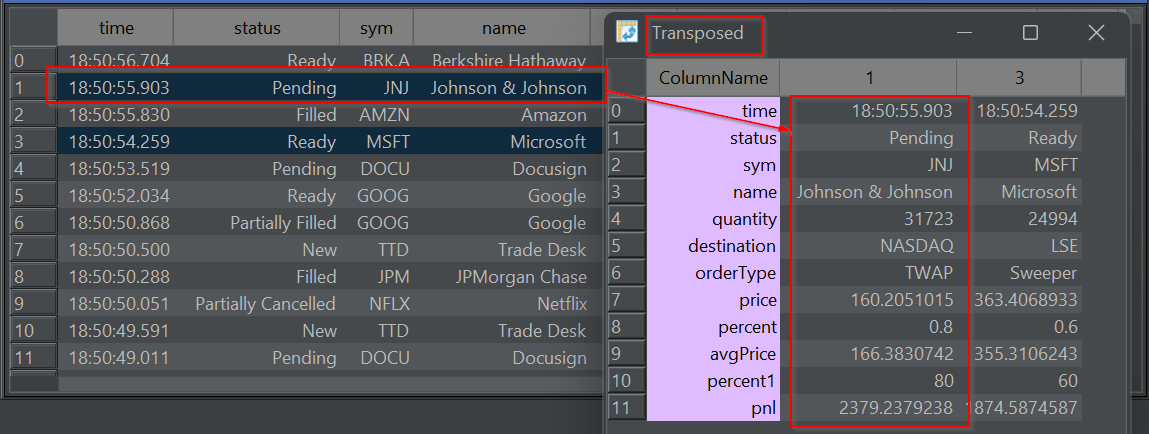
Dive-into Nested Results
Double-click on a nested array or kdb structure (table/dict) to pop-out a table showing only the nested item. You can repeat this to dig deeper and deeper into nested data. (Thanks to Oleg/QPad on pioneering this idea).
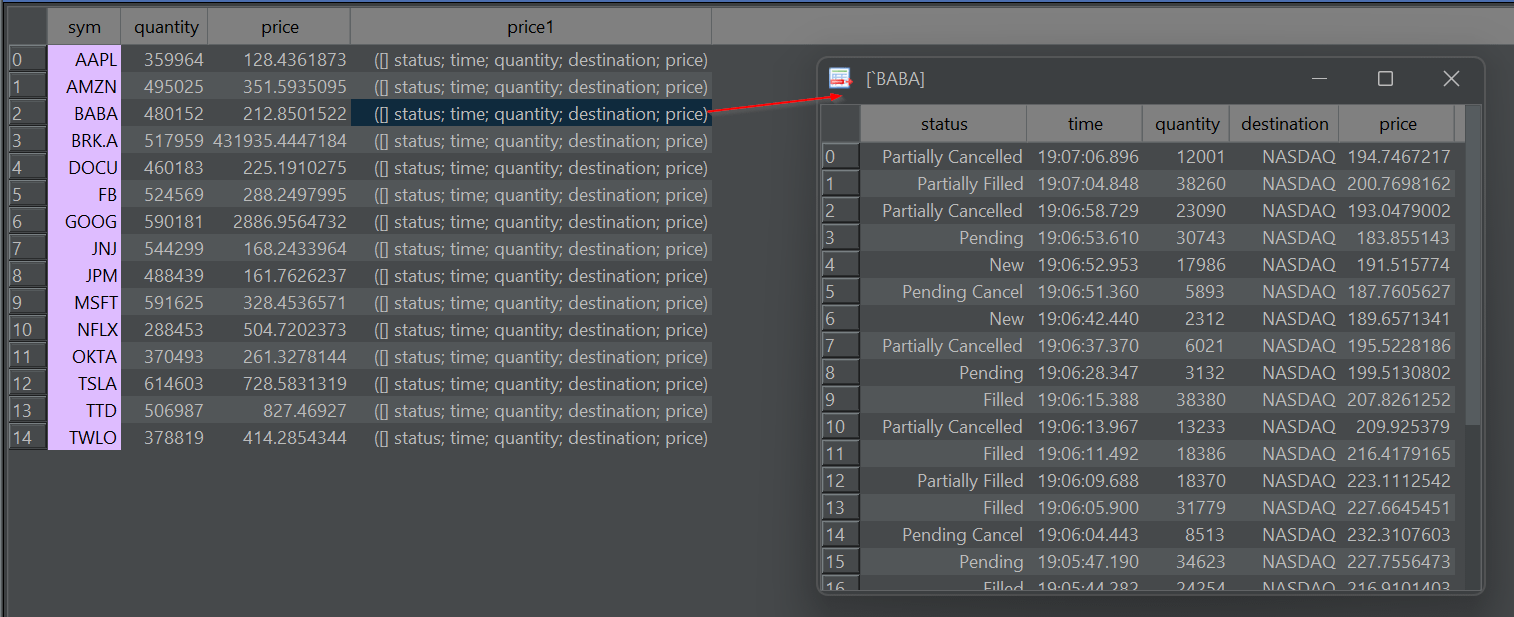
As well as these new features, a large number of bugs were fixed:
- 4K Monitor support was significantly improved. You have the option to scale the full UI in preferences.
- Apple Mac got a dedicated release and custom App download.
- We upgraded kdb+ c/jdbc.java to allow SSL TLS.
Full Release Info:
All past release changes can be found here.
2025-05-12 – 4.09 – Improve Autocomplete suggestions
– Add namespace listing panel.
– Improve QDoc to add file level details.
2025-04-22 – 4.08 – Bugfix: Candlestick charts were wrong as receiving wrong timezone from kdb driver. Timezone now set to UTC.
– Bugfix: “Save as” to .sql was shrinking text. Now fixed.
– Bugfix: Show red X close on every document tab.
2025-04-06 – 4.07 – Add UI Scaling and Font size as separate options to help with 4K monitors
– Bugfix: Kdb+ Queries with errors could cause 30 second freezes.
– Bugfix: Switch back to MonoSpaced font. Variable width fonts cause wrong caret position.
– Improved high resolution QStudio icon.
– Mac: Bugfix: Prefences dialog fixed and allows choosing font.
– Mac: Fixed Menu shoing about/preferences/exit.
– Mac: Allow Command+Option+E to run current query.
– 4K handling improved sizing of dialogs.
– Bugfix: Improved duckdb init when folder is empty.
2025-03-13 – 4.06 – Add ability to transpose rows.
– DuckDB 1.2.1. Improve display of DuckDB arrays.
– Add comma separator for thousands option.
2025-02-23 – 4.05 – Upgrade kdb+ c/jdbc.java to allow SSL TLS.
– Add preference to allow hiding all tooltips.
– Double-click on kdb+ table with dictionary/table/list nested in cell will pop it out.
2025-01-23 – 4.04 – Show column info (avg/min/max) when column header is hovered.
– Remove watched expressions entirely.
– Improved UI threading for tree/chart display.
May 9th, 2025 by admin
2025-05-08 – Private equity firm TA announced an “All-Cash Offer to Acquire FD Technologies, Owner of Global Real-Time Analytics Leader KX”.
Most people are probably wondering how this came about:
- 1996 – Brian established First Derivatives (FD) in 1996 from his mother’s spare bedroom (Newry, Northern Ireland) with a loan of £5,000 from the Credit Union.
- 1993 – Arthur Whitney and Janet Lustgarten jointly form the company KX
- 1998 – Kdb+ – In-memory column based database created by KX
- KX and FD work in partnership to grow the business.
- 2014-10 – First Derivatives acquires a controlling stake in Kx Systems.
- 2018 – FD agrees to buy out minority Kx Systems shareholders (Arthur and Janet)
- 2019 – First Derivatives completes acquisition of the minority shareholdings in Kx Systems, taking the company’s total stake in the business to 100 per cent for $53.8 million (€48m) in cash.
“The deal marks an important milestone for the company”, chief executive Brian Conlon said.
- 2019-07-28 – Brian Conlon, one of Northern Ireland’s most successful businessmen passes away. (link)
- 2020-01 – Seamus Keating appointed as CEO
- 2024-03 – FD Technologies broken into 3 separate firms:
- MRP – Marketing (spun off into a merger)
- First Derivative consulting arm.
- FD Technologies owning the KX software business
- 2024-12 – FD Technologies plc (LON:FDP) completes sale of First Derivative (consultancy) to EPAM Systems, Inc..
- 2025-05-08 – Private equity firm TA announced an “All-Cash Offer to Acquire FD Technologies, Owner of Global Real-Time Analytics Leader KX”.
July 24th, 2024 by admin
It’s been 2 years since I worked full time in kdb+ but people seem to always want to talk to me about kdb+ and where I think it’s going, so to save rehashing the same debates I’m going to put it here and refer to it in future. Please leave a comment if you want and I will reply.
Let’s first look at the use cases for kdb+, consider the alternatives, then which I think will win for each use-case and why.
Use Cases
A. Historical market data storage and analysis. – e.g. MS Horizon, Citi CloudKDB, UBS Krypton (3 I worked on).
B. Local quant analysis – e.g. Liquidity analysis, PnL analysis, profitability per client.
C. Real-time Streaming Calcuation Engines – e.g. Streaming VWAP, Streaming TCA…
D. Distributed Computing – e.g. Margin calculations for stock portfolios or risk analysis. Spread data out, perform costly calcs, recombine.
Alternatives
Historical Market Data – kdb+ Alternatives
A large number of users want to query big data to get minute bars, perform asof joins or more advanced time-series analysis.
- New Database Technologies – Clickhouse, QuestDB.
- Cloud Vendors – Bigquery / redshift
- Market Data as a Service
Let me tell you three secrets, 1. Most users don’t need the “speed” of kdb+. 2. Most internal bank platforms don’t fully unleash the speed of kdb+. 3. The competitors are now fast enough. I mean clickbench are totally transparent on benchmarking..
Likely Outcome: – Kdb+ can hold their existing clients but haven’t and won’t get the 2nd tier firms as they either want cloud native or something else. The previous major customers for this had to invest heavily to build their own platform. As far as I’m hearing the kdb cloud platform still needs work.
Local Quant Analysis – Alternatives
- Python – with DuckDB
- Python – with Polars
- Python – with PyKX
- Python – with dataframe/modin/….
Now I’m exaggerating slightly but the local quant analysis game is over and everyone has realised Python has won. The only question is who will provide the speedy add-on. In one corner we have widely popular free community tools that know how to generate interest at huge scale, are fast and well funded. In the other we have a niche company that never spread outside finance, wants to charge $300K to get started and has an exotic syntax.
Likely Outcome: DuckDB or Polars. Why? It’s free. People at Uni will start with it and not change. Any sensible quant currently in a firm will want to use a free tool so that they are guaranteed to be able to use similar analytics at their next firm. WIthout that ability they can only go places that have kdb+ else face losing a large percentage of their skillset.
Real-time Streaming / Distributed Computing
These were always the less popular cases for kdb+ and never the ones that “won” the contract. The ironic thing is, combining streaming with historical data in one model is kdbs largest strength. However the few times I’ve seen it done, it’s either taken someone very experienced and skillful or it has become a mess. These messes have been so bad it’s put other parts of the firm off adopting kdb+ for other use cases.
Likely Outcome: Unsure which will win but not kdb+. Kafka has won mindshare and is deployed at scale but flink/risingwave etc. are upcoming stars.
Summary
Kdb+ is an absolutely amazing technology but it’s about the same amazing today as it was 15 years ago when I started. In that time the world has moved on. The best open source companies have stolen the best kdb+ ideas:
- Parquet/Iceberg is basically kdb+ on disk format for optimized column storage.
- Apache Arrow – in-memory format is kdb+ in memory column format.
- Even Kafka log/replay/ksql concept could be viewed as similar to a tplog viewed from a certain angle.
- QuestDB / DuckDB / Clickhouse all have asof joins
Not only have the competitors learnt and taken the best parts of kdb+ but they have standardised on them. e.g. Snowflake, Dremio, Confluent, Databricks are all going to support Apache Iceberg/parquet. QuestDB / DuckDB / Python are all going to natively support parquet. This means in comparisons it’s no longer KX against one competitor, it’s KX against many competitors at once. If your data is parquet, you can run any of them against your data.
As many at KX would agree I’ve talked to them for years on issues around this and to be fair they have changed but they are not changing quick enough.
They need to do four things:
- Get a free version out there that can be used for many things and have an easy reasonable license for customers with less money to use.
- Focus on making the core product great. – For years we had Delta this and now it’s kdb.ai. In the meantime mongodb/influxdb won huge contracts with a good database alone.
- Reduce the steep learning curve. Make kdb+ easier to learn by even changing the language and technology if need be.
- You must become more popular else it’s a slow death
This is focussing on the core tech product.
Looking more widely at their financials and other huge costs/initiatives such as AI and massive marketing spending, wider changes at the firm should also be considered.
2024-08-03: This post got 10K+ views on the front page of Hacker News to see the followup discussion go here.
Author: Ryan Hamilton
July 21st, 2024 by admin
I decided to go check what KX had done with the core platform over the last 10+ years.
Did I miss anything? Thoughts?
Tech Changes:
- 2012.05.29 – 3.0 – Huge move to 64-bit
- 2013.06.09 – 3.1 – Improved performance / parallel
- 2014.08.22 – 3.2 – Added JSON / Websocket
- 2015.06.01 – 3.3 – Improved performance / parallel
- 2016.05.31 – 3.4 – SSL/TLS Security. Improved performance / IPC.
- 2017.03.15 – 3.5 – Improved performance / parallel. Socket sharding. Debugger.
- 2018.05.16 – 3.6 – AnyMap
- 2020.03.17 – 4.0 – Improved performance / Limits. Multithreaded primitives. Data encryption.
- 2024.02.13 – 4.1 – Improved performance / parallel. New dictionary syntax.
One user suggested Deferred Sync. I’m not including it as I think the implementation is bad and encourages code that would be unsafe and dangerous. To get an idea of why, see this excellent article: https://journal.stuffwithstuff.com/2015/02/01/what-color-is-your-function/
June 6th, 2024 by admin

QStudio is the best SQL IDE for data analysis.
DuckDB is the best free database for OLAP analytical queries.
Together they provide a powerful desktop platform for data analysis.
- Powerful Local Database – qDuckDB is now at the core of qStudio.
- Save Locally – Convert a query result from any database to store it locally.
- Parquet File Viewer – Click to open a parquet file on windows.
Parquet is the stored data standard of the future and works with everything.
- Join Data from Different Data Sources
 SmartDisplay is QStudio’s column-based automatic formatting system. By adding simple _SD_* suffixes to column names, you can enable automatic number, percentage, and currency formatting,Sparklines, microcharts and much more. This mirrors the behaviour of the Pulse Web App, but implemented natively for QStudio’s result panel.
SmartDisplay is QStudio’s column-based automatic formatting system. By adding simple _SD_* suffixes to column names, you can enable automatic number, percentage, and currency formatting,Sparklines, microcharts and much more. This mirrors the behaviour of the Pulse Web App, but implemented natively for QStudio’s result panel.















